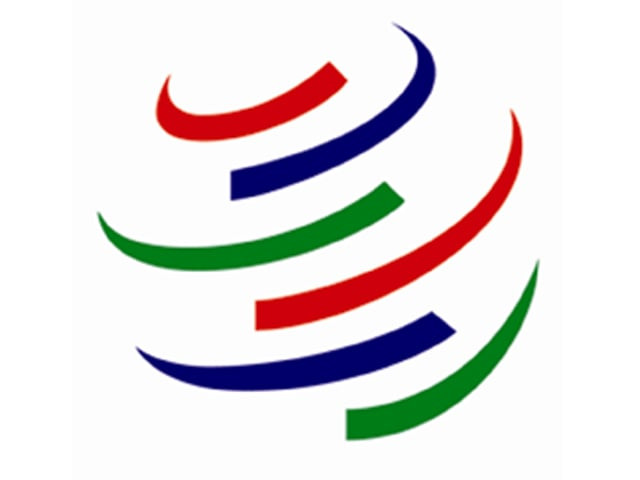Avoiding complex procedures: Pakistan at forefront of WTO agreement
Country could increase trade volumes, competitiveness by introducing trade facilitation measures

WTO logo.
During the ninth World Trade Organisation (WTO) Ministerial Conference held in Bali in 2013, WTO members including Pakistan concluded the Trade Facilitation Agreement which was part of the WTO’s Doha Development Agenda in 2001. It took 14 years for WTO members to reach a consensus, which, according to trade professionals, is a landmark achievement.
Why did the international community think it important to conclude a multi-lateral agreement to facilitate trade when customs tariffs globally were going down? According to the United Nation Conference on Trade and Development (UNCTAD), global trade is still encumbered with complex procedures and transactions that involve numerous parties, require lengthy documents and has to comply with multiple and overlapping regulatory procedures. The UNCTAD has estimated that the compliance cost for traders to meet these requirements could be more than the incidence of customs duty paid on imports of goods.

Timely and inexpensive trade transactions are essential for countries to be able to integrate with the global value chain. It has, therefore, become important for the international community to devise a global discipline plan for cost effective customs transactions system. The WTO is of the view that by implementing the provisions of the trade facilitation agreement, the developing countries can gain as much as 2% savings in their global trade and generate benefits to the tune of 0.25% in the gross domestic product.
The trade facilitation would particularly be beneficial to the Small and Medium Enterprises (SME) sector, which is the backbone of any economy. In Pakistan’s case, the SME sector has not been able to play a prominent role in international trade due to the high transaction cost related to customs and regulatory compliance.
The inefficiencies in trade regulations are also preventing developing countries like Pakistan in realising foreign direct investment (FDI) potential. There are a number of studies that show that economies having transparent, predictable and business-friendly regulatory environment have been able to attract more FDI compared to its counterpart and are well integrated into the global value chain.
The agreement is a landmark achievement because there was recognition that members have to move beyond the ‘software side of trade’ which includes policy regulations to the ‘hardware of trade’ which are customs procedures and focus on the way trade takes place globally.
The agreement is also different in its approach from other WTO initiatives as it provides sufficient flexibility to developing countries in the implementation process. The developing countries will be required to implement the provisions under three categories.
In the first category, members will notify the provisions that they will implement immediately. In the second category, members will categorise provisions which they will implement after a transitional period.
In the third category, the developing countries will implement provisions after they get assistance for capacity-building from developed countries.
Pakistan has been at the forefront in the WTO for concluding this agreement. The efforts of Pakistan have been recognised. It is also important for Pakistan to show the same level of keenness in the implementation of this agreement.
The reforms agenda is one of the important priorities of the present government where the Federal Board of Revenue has been in the radar of the policymakers for not only enhancing tax revenues but also facilitating Pakistan’s global trade.
The customs administration in Pakistan has been some of the few exceptions that have undergone the reform process in the public sector. Pakistan’s customs authority has to a considerable extent automated procedures.
The Organisation for Economic Co-operation and Development (OECD) has developed trade facilitation indicators to help governments take informed decisions to improve trade competiveness. According to the OECD, Pakistan’s performance is below average compared to other Asian and lower middle-income countries. The OECD is of the view that Pakistan could gain substantial dividends in terms of trade volumes and trade competiveness by introducing trade facilitation measures.
The World Bank periodically publishes the Global Logistic Index which also looks at the software of trade facilitation such as customs procedure and international shipments. In the most recent index, Pakistan scored 2.8 out of 5. The global average is 2.9.
The agreement provides a good opportunity to expedite reforms in the customs administration, which, otherwise, would have been difficult due to the country’s political economy. Though the agreement creates binding commitment for the developed countries to provide capacity-building assistance to developing countries, policymakers should realise that the donor community cannot replace the role of the government. The reform has to be led and owned by Pakistan.
There is sufficient evidence that convincingly demonstrates that increased trade raises income levels and improves living standards. The complete implementation of this agreement could provide an additional benefit of $2 billion to the private sector of the country annually and enhance competitiveness.
The writer is a civil servant with 20 years of experience on issues related to Pakistan’s trade and development
Published in The Express Tribune, May 18th, 2015.
Like Business on Facebook, follow @TribuneBiz on Twitter to stay informed and join in the conversation.



1733130350-0/Untitled-design-(76)1733130350-0-208x130.webp)















COMMENTS
Comments are moderated and generally will be posted if they are on-topic and not abusive.
For more information, please see our Comments FAQ